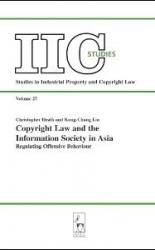
Author : Christopher Heath and Kung-Chung Liu (eds)
Publishing Date : Jul 25, 2017
The book takes a look at the six most important current topics arising from copyright law in the information society, and for each topic provides an in-depth introduction that compares the approaches taken in Europe and the US. Each topic is introduced by an expert, and the issues are then analysed in separate country reports representing nine Asian jurisdictions: China, Taiwan, Hong Kong, Japan, Korea, Singapore, Malaysia, Thailand and the Philippines.
The six topics are:
The Expansion of Copyright Law and its Social Justification: Introduction by Reto Hilty, Max Planck Institute, Munich
Internet Trade, Digital Works and Parallel Imports: Introduction by Christopher Heath, European Patent Office, Munich
The Collective Exercise of Copyrights: Introduction by Kung Chung Liu, Academia Sinica, Taiwan
The Law on Anti-Circumvention and Digital Rights Management: Introduction by Andy Sun, National Chenchi University, Taipei, Taiwan and Zhi Wei, Peking University, Beijing
Copyright Contracts, Public Policy and Antitrust: Introduction by Estelle Derclaye, Queen Mary University of London
Contributory and Vicarious Liability for Copyright Infringement: Introduction by Andy Sun, National Chenchi University, Taipei, Taiwan

Author : Correa, Carlos M., Hilty, Reto M.
Publishing Date : Mar 20, 2023
This open access book is the outcome of a Global Forum on Innovation, Intellectual Property and Access to Medicines held in December 2019 at the Max Plank Instititute in Munich, organised by the South Centre and the Max Plank Institute. The academics and experts from international organisations participating have contributed chapters to this book. The book is for policy makers (in Ministries of Health, Ministries of Trade, Ministries of Foreign Affairs, patent offices), but also relevant for academics (law, trade, public health), on the flexibilities available in the Agreement on Trade Related Aspects of Intellectual Property Rights (TRIPS) of the World Trade Organization to promote access to medicines.
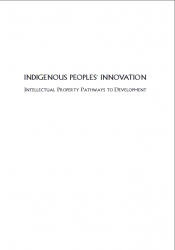
Author : Drahos, Peter; Frankel, Susy
Publishing Date : Mar 22, 2023
Traditional knowledge systems are also innovation systems. This book analyses the relationship between intellectual property and indigenous innovation.
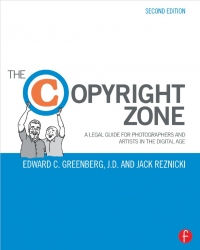
Author : Edward C. Greenberg, Jack Reznicki
Publishing Date : Feb 11, 2015
If you license or publish images, this guide is as indispensable as your camera. It provides specific information on the legal rights of photographers, illustrators, artists, covering intellectual property, copyright, and business concerns in an easy-to-read, accessible manner. The Copyright Zone, Second Edition covers: what is and isn’t copyrightable, copyright registration, fair use, model releases, contracts and invoices, pricing and negotiation, and much more.
Presented in a fun and easy to digest style, Jack Reznicki and Ed Greenberg, LLC help explain the need-to-know facts of the confusing world of legal jargon and technicalities through real world case studies, personal asides, and the clear writing style that has made their blog Thecopyrightzone.com and monthly column by the same name in Photoshop User magazine two industry favorites. The second edition of this well-reviewed text has almost doubled in size to ensure that every legal issue you need to know about as a photographer or artist is covered and enjoyable to learn!

Author : Giblin, Rebecca; Weatherall, Kimberlee
Publishing Date : Mar 23, 2023
What if we could start with a blank slate, and write ourselves a brand new copyright system? What if we could design a law, from scratch, unconstrained by existing treaty obligations, business models and questions of political feasibility? Would we opt for radical overhaul, or would we keep our current fundamentals? Which parts of the system would we jettison? Which would we keep? In short, what might a copyright system designed to further the public interest in the current legal and sociological environment actually look like? Taking this thought experiment as their starting point, the leading international thinkers represented in this collection reconsider copyright’s fundamental questions: the subject matter that should be protected, the ideal scope and duration of those rights, and how it should be enforced. Tackling the biggest challenges affecting the current law, their essays provocatively explore how the law could better secure to creators the fruits of their labours, ensure better outcomes for the world’s more marginalised populations and solve orphan works. And while the result is a collection of impossible ideas, it also tells us much about what copyright could be – and what prescriptive treaty obligations currently force us to give up. The book shows that, reimagined, copyright could serve creators and the broader public far better than it currently does – and exposes intriguing new directions for achievable reform.
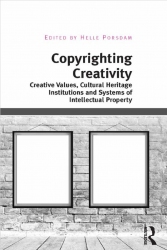
Author : Helle Porsdam
Publishing Date : Mar 09, 2016
What is the relationship between creativity, cultural heritage institutions and copyright? Who owns culture and cultural heritage? The digital age has expanded the horizon of creative possibilities for artists and cultural institutions - what is the impact on legal regimes that were constructed for an analogue world? What are the tensions between the safeguarding of cultural heritage and the dissemination of knowledge about culture? Inspired by a three year research project involving leading European universities, this book explores the relationship between copyright and intellectual property, creativity and innovation, and cultural heritage institutions. Its contributors are scholars from both the humanities and the social sciences - from cultural studies to law - as well as cultural practitioners and representatives from cultural heritage institutions. They all share an interest in the contribution of intellectual property to the role of cultural institutions in making culture accessible and encouraging new creativity.
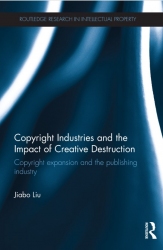
Author : Jiabo Liu
Publishing Date : Dec 12, 2012
This book examines the relationship between the legal extension of copyright duration as an enduring means of copyright protection and the growth of the UK book publishing industry as a typical creative industry reliant on copyright. The book draws on Schumpeter’s theory of creative destruction to analyse the implications of copyright law and policy on the book industry and illustrate the dynamic interaction between copyright expansion and the growth of the creative industries. The book reviews the historical development of UK copyright expansion and also considers copyright in the digital age. It explores the legal and economic concerns about copyright protection in general, and the expansion of copyright duration in particular. Using an innovative empirical method, it explores whether the expansion of the duration of copyright promotes or precludes the growth of book publishing industry. It goes on to suggest changes to copyright policy which would have an impact on the economics of innovation in the creative industries.
This book will be of particular interst to scholars and students of Intellectual Property Law.
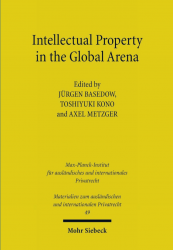
Author : Kono, Toshiyuki; Basedow, Jürgen; Metzger, Axel
Publishing Date : Mar 20, 2023
The private international law of intellectual property is currently much debated both in Europe and abroad. Art. 8 of the Rome II Regulation of 2007, which codifies a territorial approach for the infringement of intellectual property, has provoked an intensive discussion in Europe as to whether the lex loci protection is still appropriate for intellectual property litigation in the age of worldwide networks. A condensed outcome of this debate is summarized in the »Principles for Conflict of Laws in Intellectual Property« (CLIP Principles) drafted by the European Max Planck Group on Conflict of Laws in Intellectual Property (CLIP), published recently in a second preliminary draft. On the international scale, the American Law Institute's »Intellectual Property: Principles Governing Jurisdiction, Choice of Law, and Judgments in Transnational Disputes« of 2007 (ALI Principles) are the focal point of the debate. A Japanese project (»Transparency Proposal«) was finalized in 2009. This volume provides a comparative analysis of the three proposals. It compiles papers presented at an international conference held in Tokyo in May 2009.
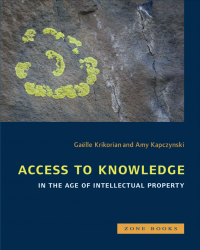
Author : Krikorian, Gaëlle; Kapczynski, Amy
Publishing Date : Mar 20, 2023
A movement emerges to challenge the tightening of intellectual property law around the world.At the end of the twentieth century, intellectual property rights collided with everyday life. Expansive copyright laws and digital rights management technologies sought to shut down new forms of copying and remixing made possible by the Internet. International laws expanding patent rights threatened the lives of millions of people around the world living with HIV/AIDS by limiting their access to cheap generic medicines. For decades, governments have tightened the grip of intellectual property law at the bidding of information industries; but recently, groups have emerged around the world to challenge this wave of enclosure with a new counter-politics of “access to knowledge” or “A2K.” They include software programmers who took to the streets to defeat software patents in Europe, AIDS activists who forced multinational pharmaceutical companies to permit copies of their medicines to be sold in poor countries, subsistence farmers defending their rights to food security or access to agricultural biotechnology, and college students who created a new “free culture” movement to defend the digital commons. Access to Knowledge in the Age of Intellectual Property maps this emerging field of activism as a series of historical moments, strategies, and concepts. It gathers some of the most important thinkers and advocates in the field to make the stakes and strategies at play in this new domain visible and the terms of intellectual property law intelligible in their political implications around the world. A Creative Commons edition of this work will be freely available online.
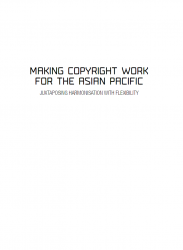
Author : Lai, Jessica
Publishing Date : Mar 22, 2023
This book provides a contemporary overview of developing areas of copyright law in the Asian Pacific region. While noting the tendency towards harmonisation through free trade agreements, the book takes the perspective that there is a significant amount of potential for the nations of the Asian Pacific region to work together, find common ground and shift international bargaining power. Moreover, in so doing, the region can tailor any regional agreements to suit local needs. The book addresses the development of norms in the region and the ways in which this can occur in light of the specific nature of the creator–owner–user paradigm in the region and the common interests of Indigenous peoples.
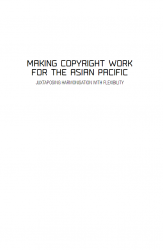
Author : Lai, Jessica
Publishing Date : May 15, 2023
This book provides a contemporary overview of developing areas of copyright law in the Asian Pacific region. While noting the tendency towards harmonisation through free trade agreements, the book takes the perspective that there is a significant amount of potential for the nations of the Asian Pacific region to work together, find common ground and shift international bargaining power. Moreover, in so doing, the region can tailor any regional agreements to suit local needs. The book addresses the development of norms in the region and the ways in which this can occur in light of the specific nature of the creator–owner–user paradigm in the region and the common interests of Indigenous peoples.
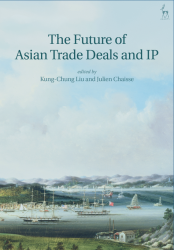
Author : Liu, Kung-Chung; Chaisse, Julien
Publishing Date : Mar 20, 2023
The first part of this open access book sets out to re-examine some basic principles of trade negotiation, such as choosing the right representatives to negotiate and enhancing transparency as a cure to the public’s distrust against trade talks. Moreover, it analyses how the Comprehensive and Progressive Agreement for the Trans-Pacific Partnership (CPTPP) might impact on the Regional Comprehensive Economic Partnership's (RCEP) IP chapter and examines the possible norm setters of Asian IP. It then focuses on the People's Republic of China's (PRC) trade and IP strategy against the backdrop of the power games between the PRC, India and the US. The second part of the book reflects on issues related to investor–state dispute settlement and its relationship with IP, such as how to re-calibrate the balance in international investment arbitration, and whether compulsory license of IP constitutes expropriation in India, the PRC and select ASEAN countries. The third part of the book questions and strives to improve some of the proposed IP provisions of CPTPP and RCEP and to redefine some aspects of international IP norms, such as: pre-grant patent opposition and experimental use exception; patent term extension; patent linkage and data exclusivity for the pharmaceutical sector; plant variety protection; pre-established damages for copyright infringement; and the restructuring of copyright limitations in the public interest. The open access edition of this book is available under a CC BY-NC-ND 3.0 licence on bloomsburycollections.com. Open access was funded by the Applied Research Centre for Intellectual Assets and the Law in Asia, School of Law, Singapore Management University.
123NextLast
